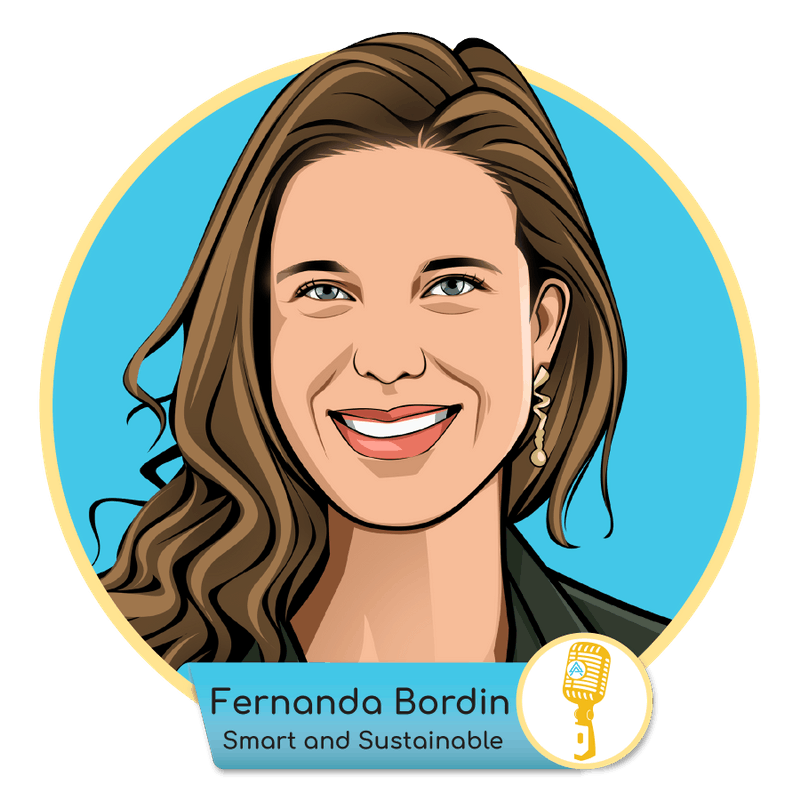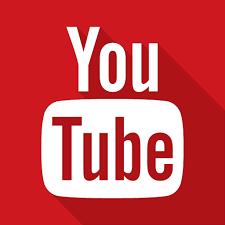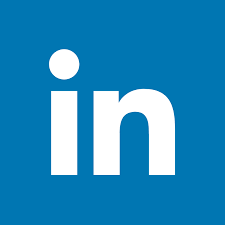In this episode, Ghazenfer Mansoor, Founder and CEO of Technology Rivers and author of Beyond the Download, breaks down how to build AI and software products people actually use, not just download.

AlchemistX: Innovators Inside
E.14 - Fernanda Bordin: Smart and Sustainable
Published on
July 8, 2021
“Start with the client. You can start a business without a solution, but you cannot start a business without a client.” - Fernanda Bordin
Show Notes
Rachel Chalmers:
I am overjoyed to welcome Fernanda Bordin to the show. Today Fernanda is senior manager for Innovation with Gerdau Next. The new business arm of Gerdau, the largest producer of long steel in Latin America.
In that capacity, she's going to lead the next class of the Gerdau Next sales acceleration program for smart and sustainable technologies. Before coming to Gerdau, Fernanda worked with open Innovation and data analytics at NASA via the laboratory of Innovation science at Harvard and managed the business incubation program at Mercedes-Benz R&D North America. She also started Mercedes at the business Innovation Department in Brazil where she launched and tested several companies.
Fernanda, thank you so much for taking time with us today.
Fernanda Bordin:
I'm honored to be here. Thank you for having me.
Rachel Chalmers:
It's a pleasure. What first drew you to a career in Corporate Innovation?
Fernanda Bordin:
It was really all about change. The possibility of actually helping the company shape their future and help them figure it out. “Okay, what are they going to do when the world happens?” When other companies come along and when other startups come along. How are they going to react? Being able to help them there. Not only that but having permission to ask questions and to question how things were working, but also getting rewarded and paid for it. That's what drew me there. Then once I was there, I continued just because it's so rewarding. Sometimes stressful, but starting new businesses, exploring new things, it's really a reward on its own.
Rachel Chalmers:
Yeah, I love your point about curiosity. There are so many roles in which we can be punished for asking how things could be different. But this work is one where that's the entire point. That's what we're compensated for. I am curious though, why Corporate Innovation? Why not a startup?
Fernanda Bordin:
Well, you see here is where you start balancing a little bit in your world. Your personality and your desire. I always wished to go out and to explore things. On the other side, this gave me a safety net, where I knew I had a big Corporation behind me. I was taking risks but I wasn't alone and I feel that that's always a struggle you have as an entrepreneur. I've met many of them. A lot of the time you feel like you're by yourself and all decisions that you make; you’re the only one making it. You're obviously not a specialist in everything.
When you work in Corporate Innovation, then you really have that support. I can literally call marketing and say, “Hey, this is what we're thinking for this new business.” You you still get that support. You still have that second voice to balance you out.
Rachel Chalmers:
I love that answer because there's this tendency in start-up land to think, curious and ambitious people go and work at startups. People who go and work at Corporations, just want to pull a check. But there are all kinds of reasons other than temperament why people choose to work for a large Corporation. One of the big ones is literally just to have company. To not be so alone. To have other minds to bounce off of. I think that's really insightful.
Fernanda Bordin:
That's one of the biggest advantages. There are many, the paycheck is also one of them, but it is good to not be alone.
Rachel Chalmers:
How did Gerdau Next get started?
Fernanda Bordin:
It's a new development for people that don't know. We actually started as Gerdau Next in Brazil in July 2020 and Gerdau Next North America actually started in March this year. This came from the desire in the company to actually start exploring new businesses. To diversify the portfolio, accelerate new businesses, interact with startups and make external partners.
We even have a branch in merges and acquisitions. So there really was that desire there to go beyond still. One of the things that's really interesting is that we don't consider ourselves as an Innovation department. Simply because Innovation can be found throughout Gerdau. That's also another thing that people keep telling me, “Wait, you're working with an Innovative steel manufacturer? Is that even possible?” In our case, it really is. If you look at our offices, no startup would feel lost there.
They are all new. They are fresh. They have colors. They are incentivizing collaboration. We are exploring a ton of digital solutions. We have IOT teams, we have industry 4.0 teams. We actually have a team of developers and software developers inside of Gerdau. We really are pushing this really strongly and this has been going for quite some time inside of Gerdau. Obviously we have an amazing R&D as well, which is always developing new steel.
Rachel Chalmers:
Can you tell our listeners a little bit more about the company and about long steel? It was new to me when you and I first started talking and I've had a really steep learning curve. It's a fascinating space.
Fernanda Bordin:
It definitely is. Gerdau in particular actually works on two main channels. One is the long steel itself, which supplies pretty much the construction companies.
Rachel Chalmers:
So, these are the i-beams in skyscrapers?
Fernanda Bordin:
Exactly. Anything you see there we pretty much produce. We do have clients and partners that are going to transform this into the actual product that is consumed for construction. Then the second main area that we have is really on the automotive segment. So there we are producing all the steel parts that go inside of the cars and trucks that you have. You have a lot of diversity and especially when you're talking about special steel, almost every client gets their one type of Steel for them. So everything is really tailored made for them versus having a lot of standardization. That's a little bit of an interesting side of things. Because on the long steel side it's pretty much the standards that the market already has.
Rachel Chalmers:
So tell us a little bit more about this accelerator program that you're putting together for Gerdau.
Fernanda Bordin:
It's awesome. I'm not just saying this because we're building it also with Alchemist, but it truly, truly is something that I'm very excited about. Especially how we're focusing on increasing sales and bringing growth to the startups. I feel that so many of the programs out there don't necessarily touch on this as strongly. Really this is our main focus, right? We are looking into getting some startups that are a little bit more mature than traditionally. Then we are taylor making the training that they're going to receive.
We're really going to go and say, “Show me your sales material, show me how you make sales, and then we're going to diagnose that and build a training and workshop that is going to address exactly what they need. That's really just one of the pillars that we are building.
When you look at the second pillar that we have, which is the network. We are not only going to help people sell better, but we're going to take them, open our network, open Gerdau’s contact list, and introduce them to our clients. Introduce them to our suppliers, and take them in front of the right people that can make a decision already. I feel that that's going to be extremely powerful.
Rachel Chalmers:
From my experience working with Alchemist Accelerator, with B2B companies, the opportunity to get a warm introduction into an ecosystem, like this - which maybe isn't as connected to Silicon Valley, as the financial institutions in the insurance companies, which all have skunkworks Labs here. Getting into something like the steel industry and its downstream and upstream partners is just such an incredible opportunity.
Fernanda Bordin:
I absolutely agree because we want to be sure that we're being complete. We are also looking into building a customer summit for these startups. That's going to be a new opportunity or an additional opportunity for them to get feedback from their target clients and how they can improve. I feel that this covers a 360 degree sales aspect of building a new company. Especially growing a new company.
Rachel Chalmers:
You have a secret goal here, don't you? Not just to increase sales but to build new multinationals?
Fernanda Bordin:
Yes, that's definitely true. That's the dream. We're not in this for the short run. We're here for the long run. As the program is running the startups that are selected - we're going to have a separate team looking at their concept and seeing how we can bring these companies into new countries. Currently Gerdau has a presence in almost every country in the Americas.
We already have entries into these markets. What we're planning to do is - let's analyze the potential. Let's see if there's a market for this new solution, for this new model, and look at how we can bring these companies over. We're very open to different models. It doesn't need to be something where we are going to license that deal. You can be a licensing deal, it can be a joint-venture. It can be an Investment through our corporate venture. We are open to the models and seeing if the potential is there, how can we help the startups grow internationally and nationally?
Rachel Chalmers:
I want to pick up on what you said there about potentially investing. You know, a traditional accelerator takes equity in exchange for the services it provides. But you're doing something a little bit different. Do you want to talk more about that?
Fernanda Bordin:
We're not requiring any type of equity. There is absolutely no cost to participate in the program. Since we do have a Corporate venture these companies will be analyzed by our corporate venture as a potential investment which would be a completely different discussion. It's really, we're going to look at them, they're going to analyze it. If you're not open right now to funding, that's okay. If we like you, we're going to wait for you. Whenever you open a round, we just want to sit at the table.
Where I think it's very valuable - pure gold actually - is that once we analyze the company, and once we get that feedback from Paris Ventures, you as a start-up owner, actually gets that same transparent feedback. I feel that so many times as you are trying to raise money in the market, you get a “no”, and you get this very polite answer of, “Well, you know, we went in a different direction.”
Rachel Chalmers:
Or its, “It’s just not a fit for us.”
Fernanda Bordin:
Yes, exactly. “You're perfect. Just not for me. It's not you, it's me.”
As much as that spares your feelings, it really is not helpful as an owner. You need to know what you are doing wrong. Why is that not a fit? This is where we're making that commitment that we are going to be transparent.
Rachel Chalmers:
Fernanda, what do you think makes corporate Innovation so difficult?
Fernanda Bordin:
I would say there are so many potential topics on this. The most truthful one, and the main one I feel is that the companies that are going after Innovation are extremely successful. It sounds weird and the fact is, because they are so successful and they have been successful for so long that when you start talking about, let's do things differently or start questioning the way things are, or you even say “Hey, I know we're making X but we could be making 10 x if we were to change.” It takes them a while because they have been trained to actually do things in the way that works. Often with Innovation it's not that you're going from X to 10x in six weeks, it actually takes time. That means that you're bringing uncertainty, you're bringing this whole new concept and of risk where things are actually working.
Rachel Chalmers:
You're messing with a winning formula.
Fernanda Bordin:
Exactly, that's how it can be perceived. There's this other aspect as well that as companies grow, they become really good at doing what they do and only what they do. There is always this trade-off between flexibility and productivity. If you want to have an assembly line, that's going to produce just any car in the world, it's going to be a very un-efficient line because you're going to have to have double inventory, you're going to have more people and more types of specializations, you're going to have the difference in tech time. Where one product is going to take 5 minutes and the other products are going to take 10. It's going to be incredibly inefficient. That's also true for big companies. As they start growing, they become very efficient in doing and delivering their service with the same quality, which is exactly what you want as you're growing. But not necessarily what you need if you want to diversify and you want to have other ways to make money as well. I feel that that brings a lot of difficulty to the system.
Rachel Chalmers:
So my impression of you as we've been working together is that you're extraordinarily gifted at bringing these different stakeholders to the table. I've seen you persuade your business units. I've seen you pull in the marketing department, how do you make those arguments? How do you persuade people to take a risk on something as chancey as this accelerator?
Fernanda Bordin:
It's always about two things. One is finding the right partners. In every Corporation you always have people that are naturally excited. Let's call them the Corporate early adopters, right? Finding those people and knowing who they are is always very helpful. So that's one aspect of it. The other aspect is really about bringing or repurposing what you're trying to do. Always look for the win-win solution. It's never really only about what you want to do in your project. It's really about how can my project or this project actually contribute to your targets? To your KPI’s? How can we use this to also have that second message or that third message that's going to impact you in a positive way?
Rachel Chalmers:
It's interesting coming from Silicon Valley, which is the land of the zero-sum game. Literally everybody reads Peter Thiel's Zero to One. To a corporate environment where you have to look at those mutually beneficial outcomes. It's about working in-company, you've got to find ways for everyone to benefit.
Fernanda Bordin:
Exactly. I'm going to tell you more often than not, I end up with better solutions than when I started. We have to make some concession because that's then going to help the other department. The final product more often than not is better than what we started.
Rachel Chalmers:
Yeah. Functional teams are so much more than the sum of their parts.
Fernanda Bordin:
Sure, it adds complexity, but it's worth it.
Rachel Chalmers:
How would you distill all of your experience? Not just with Gerdau but with NASA and Mercedes into one or two lessons for our listeners?
Fernanda Bordin:
Well, there is much more than one or two lessons.
Rachel Chalmers:
We've got all day.
Fernanda Bordin:
I also won't go through all of them but I would say the first one and this one I think everybody has heard 50 times but I'm going to say it again just because it's very true. You always start with your client and with your target audience. I know it's cliche, but it's true.
One thing I always tell people is you can start a business without a solution but you cannot start a business without a client - every single time. Really start with a client, make sure that you're solving a problem and that the problem is real. Not the one that you think. Go for simplicity, if you don't have to build a solution right now, don't build the solution right now. Because I assure you that what you think your solution is, it's not. You're going to end up changing it anyway. That is a big one.
Another one that I really think about - and this is also one that fits for life, not only for corporate Innovation. Consider all the opportunities with care and pay attention to them. Because it has happened to me in the past when I thought I was having one conversation and I wasn't. I was having a conversation about a totally different thing. Somebody's asking you what's your opinion about Argentina. What they actually mean is, “Would you go to Argentina and start a business there?” Truly listen for the opportunities. Sometimes, somebody's going to tell you, “Hey, I have this idea. I'm going to run this thing over here.” Be open to actually paying attention. Listen to it because many times you're going to get really awesome chances and gold opportunities in there that you just didn't notice immediately.
A third point that I have and I think it's always very important is to build a strong network, not only inside of the company where you are. Also between companies and across Industries. A lot of times the solution you're looking for already exists. It's just in a different industry. It's just focused on something different but it's there. You don't have to reinvent it. If you have chances, participate in forums, go to round table's, and reach out to people. I'm not the most outgoing person, so I know the hassles of trying to network, but I found out that the best time to connect with people is when you don't need anything from them.
Rachel Chalmers:
That's so true.
Fernanda Bordin:
If you have to connect with somebody when you need something from them, it bleeds out that you have some sort of interest. When you don't need anything from them, that's when you should try. Especially if you can offer them something. Let's build something together, let's have a discussion. Try to take those opportunities to really make those connections, because they are going to help you a lot as you are facing all of your challenges.
Rachel Chalmers:
Yeah, I have literally never regretted paying anything forward in my career.
Fernanda Bordin:
Very true. The last thing that I have, which is a little bit closer once again to working in big corporations. Be careful of what I call “majority bias”. This is really when you are surrounded by people that think like you. Be that because you have the same nationality, be that because you have the same background. Very often what happens is because you're hearing your opinion back to you, you think that it’s brilliant. You ignore the two or three people that are telling you, “No, maybe that's not the perfect fit.” I have seen this happen a lot in multinationals when you're talking with the headquarters. Not because they are mean but because there's more of them.
As you sit down at the table, you have eight people from one nationality and three people from different nationalities. You have the three people telling you “Hey this is not a good idea.” But the other eight are saying, “Yeah it's awesome!”
Rachel Chalmers:
Yeah, that's a really powerful point.
Listen to your pessimists. Also listen to the pessimists inside your own head. I've found in my career when I'm making a bad decision, I have misgivings. I just squish them down and ignore them. We always want to think that things are going to work out well. We want to default to complacency but that paranoia can really be your friend.
Fernanda Bordin:
I'm going to add to that. Always try to be afraid but do it anyway. It's really about the balance of, “Expect the best, plan for the worst but do it.” Because that's the other thing. The only way you lose, is if you don't do it.
Rachel Chalmers:
Verify, but trust.
Fernanda Bordin:
Yeah, it's always a balance. That's the one thing about life, right?
Rachel Chalmers:
When you look back on your career, what are you proudest of?
Fernanda Bordin:
That's a very interesting question. Because you see personally, I always want my proudest moment to be in front of me and not behind me. I always want to have that new and important thing coming up. I'm always looking forward and not always looking back.
Rachel Chalmers:
That's such a great answer because so many people are like, “Oh, well I achieved this and that.” And you're like, “No, my best days are still ahead of me.” It's a really refreshing perspective.
Fernanda Bordin:
It makes life simpler actually. You can be proud as much as you want because we've all done amazing things, every single one of us. Always having that expectation that the next thing is coming keeps you aware and keeps you paying attention so that you can achieve it.
Rachel Chalmers:
There's this wonderful line - we're watching Hacks, which is this amazing comedy with Jean Smart - the stand-up comedian. There's a point at which she turns around to her millennial sidekick irritant, and says, “So, you're good. Good is the minimum. Everyone here is good. That's where you start.” It's such a great scene.
Fernanda Bordin:
I think that that's their reality of life, right? Because everybody is good at something. That's the other thing. We're not all good at the same thing, but we are all good at something. Good is exactly where you start.
Rachel Chalmers:
That's a really important point as well because the technocrats do tend to have this very dismissive attitude to people in the enterprise and vice versa. What I've found most useful in this communication - bridging the gap thing. Is finding out what people are good at and what they're passionate about. Then tapping into the point of view from which their decisions and their commentary makes sense. Having that sort of radical empathy and recognizing that everyone's an expert in their own field is a really powerful tool.
Fernanda Bordin:
Absolutely.
Rachel Chalmers:
How do you think the pandemic might affect corporations like Gerdau in the longer term?
Fernanda Bordin:
I'm excited for it. I think the impact is going to be so good. One and I think undeniably, the digitalization of life. So many companies had to adapt virtual work. They had to start looking through that and adopting it. I think that's going to be beneficial for every single one of the ones that were able to do it. Because once you start going digital, you start having data.
I genuinely believe that data analytics is the future of decision making. Actually, I think that for certain companies around, it's actually the reality of decision-making. It's something that I feel, “Okay, having data is so essential and it all starts by collecting data.” So going digital helps you. From there you start making smarter and smarter decisions because now you have data to support you, where before you only had gut feeling, now you can mix them both.
Rachel Chalmers:
I would push back a little on that. I would say you have the potential to make smarter and smarter decisions. There are people sitting on enormous piles of data who are resolutely ignoring what it's actually telling them.
Fernanda Bordin:
Yeah, it's very true. Another thing I strongly believe is going to happen with corporations is that they're going to become more talent centric. Before, you had to physically be there, you always had those challenges of “I found the perfect person for this job, but now I have to convince them to move a thousand miles somewhere else.” By having this possibility of virtual work or even mixed work, you can now become a lot more focused on, “This is the right person for us.”
Let them work remotely for a while and then they'll fly over, stay a week a month. Things like that really allow you to get more talent. To get the best fit to what you need. I think that that's also going to be something very important for the corporation's.
Rachel Chalmers:
That said you've been so busy and you do so many things and I know what long hours you work, how do you avoid burnout?
Fernanda Bordin:
I would say it's all about preparation of the mind and of the body. I think the biggest thing at least for me for burnout is truly being prepared psychologically to know what's going on. One thing of starting new businesses is that some days you wake up and you're the king of the world. “Oh nobody has a better idea than you have. Like that's so gonna work. That's so amazing.” Then five minutes later something happens like a client tells you “no”. Now you're feeling as if, “What was I thinking? Like of course this is a horrible idea.” Then two days later you have a new contract and now you're back to being in your kingdom. It varies a lot and you need to be prepared psychologically, to know that that's going to happen.
Rachel Chalmers:
I'm laughing because I recognize myself so much in this scenario.
Fernanda Bordin:
If you know that it's going to happen and that it’s normal, you can actually bring yourself back from both extremes. Once you are a little bit more stable, it's much harder to burn out - really having that preparation. The other thing is you have to respect your body as well. Plan for sleep and choose to sleep. That's also another thing.
Often we choose not to sleep because you're tired and I know that sounds weird. Sometimes you're like, “I want to watch TV.” Once you realize it's been four hours and it's midnight and you haven't slept... So choose to sleep. Prepare your mind to go through those rigors and that way you can at least help with burnout.
Rachel Chalmers:
That sounds great. Fernanda, what is the best way for our listeners to connect with you or follow your work?
Fernanda Bordin:
Definitely LinkedIn. I think that's one of the easiest ways to connect.
I can't believe I forgot to mention our acceleration program, where we were creating an extended judge panel. If you aren't part of a corporation, and you would be interested in participating in bringing your knowledge and part of your network, let me know. Just send me a message on LinkedIn and say “Hey I want to know more!” We can sit down and connect and talk a little bit more of ways that potentially can make sense.
Rachel Chalmers:
If you think you're not qualified, you already are, please don't hesitate to reach out.
Fernanda Bordin:
Definitely, we want you!
Rachel Chalmers:
Fernanda, is there anything I forgot to ask you?
Fernanda Bordin:
No, I think we covered everything. Thank you so much for having me, it was a pleasure to be here.
Rachel Chalmers:
It's such a pleasure to have you. Thank you so much.
References
Apply for the Gerdau Sales Accelerator Program! (Deadline July 30th 2021)
https://www2.gerdau.com/acceleration
Fernanda Bordin on Linkedin
Gerdau North America on Linkedin
Gerdau North America on Facebook
Gerdau Brazil on Linkedin
Gerdau Brazil on Twitter
Gerdau Brazil on Instagram
Gerdau Long Steel North America
Gerdau Special Steel North America
Ventures Gerdau Brazil
Gerdau Brazilian Website
Alchemist Accelerator
Peter Thiel's Zero to One - The book everyone in the Valley reads
Hacks - Starring Jean Smart - A TV show Rachel highly recommends
Intro and Outromusic composed by: www.PatrickSimpsonmusic.com
Recent Episodes

Why Most Corporate Startup Partnerships Fail And How Founders Can Think Big From Day One
Startups and corporates need each other. But most partnerships fall apart. In this episode, Ian Bergman talks with Noga Tal about what actually makes these relationships work.
.jpg?width=767&name=IIS7%20SQ%20Thumbnail%20(1).jpg)
How Amazon’s Innovation Framework Can Transform Your Startup
In this episode, Marcelo Calbucci breaks down the innovation habits that shaped his career at Microsoft, Amazon, and across six startups. He explains why small, fast iterations beat big plans, how narrative-driven strategy unlocks clarity, and why today’s founders should embrace niche, hyper-specialized solutions.
.svg.png)








